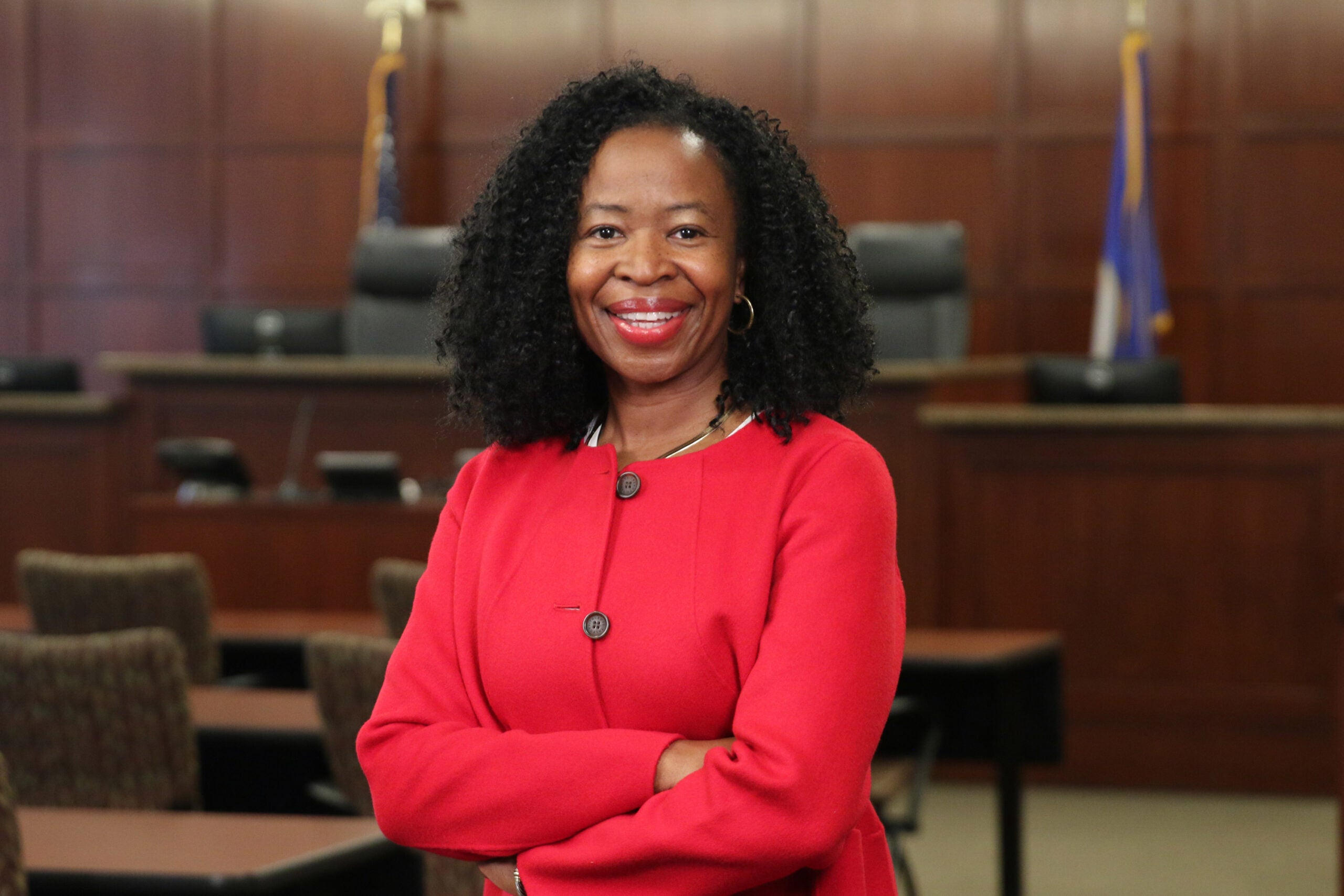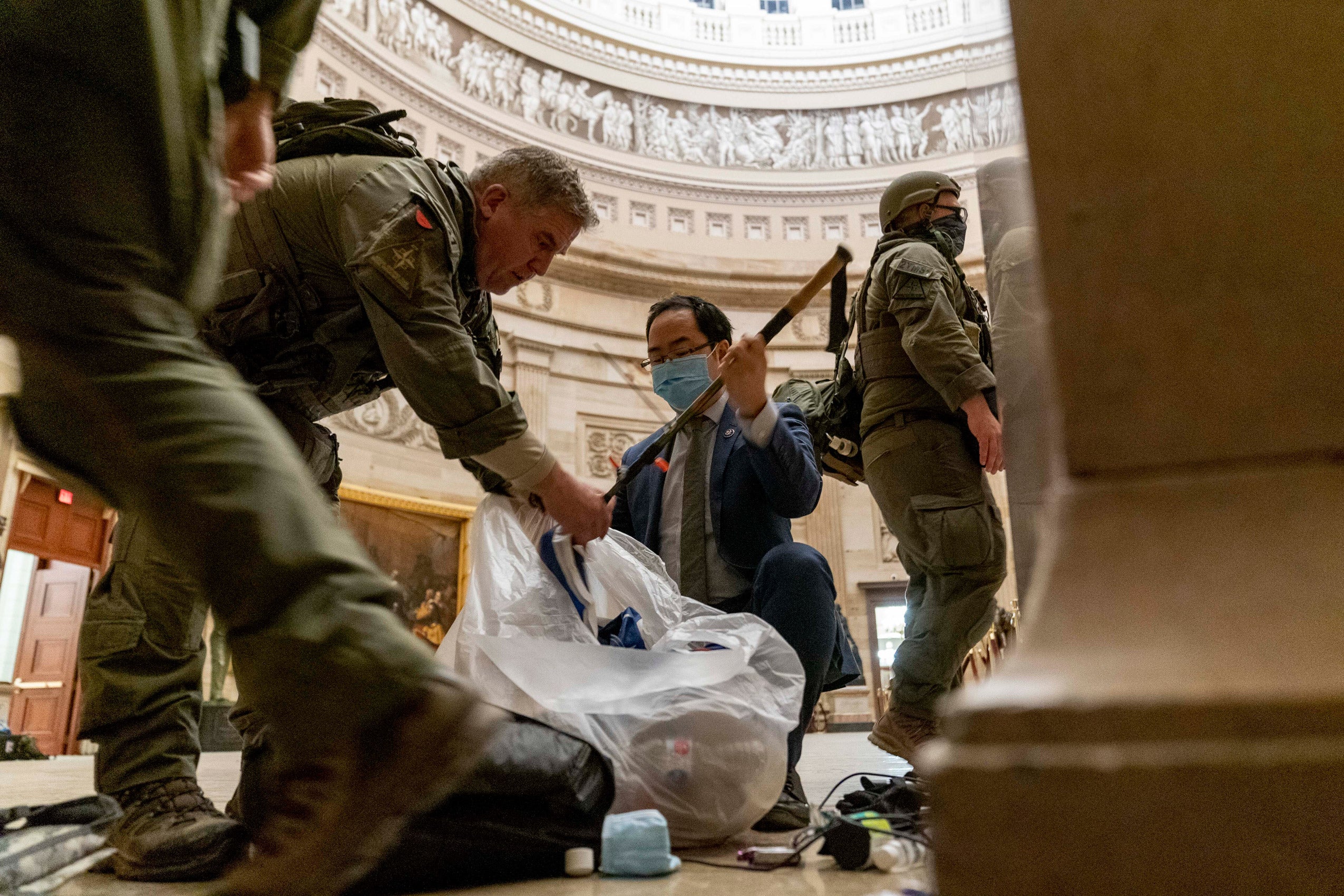Reflecting on the recent insurrection at the U.S. Capitol and the vote last week by the House of Representatives to impeach President Donald Trump for a historic second time, Harvard Law Professor Ruth Okediji LL.M. ’91 S.J.D. ’96 believes recent events can reinvigorate American democracy and serve as a lesson for the world.

“One of the international calls I received last week gave me an opportunity to consider reasons why we might be hopeful,” Okediji said in a Zoom interview Thursday. “For years, I think much of the world has felt some pressure or burden in the face of American democracy. While, as citizens we had increasingly grown derisive, globally many viewed our democracy as unassailable, easy, and comfortable.
“But January 6 has given us occasion to be sober and penitent,” she continued. “Certainly, all the immediate actors in the insurrection must bear responsibility for their actions. But their failure is ours too. All Americans must shoulder the weight of rebuilding our national character. This opportunity to do something together gives reason for hope.”
The Jeremiah Smith, Jr. Professor of Law, and co-director of the Berkman Klein Center, Okediji is a renowned scholar in international intellectual property law who has advised the United Nations, the World Trade Organization, the U.S., and many foreign governments on everything from trade policy to human development efforts. While using words like “grievous,” “embarrassment,” “shame,” and “dishonor” to describe the events that culminated in five deaths and nearly upended the democratic process, Okediji believes the storming of the U.S. Capitol offers deeper lessons, both personal and national.
American society has not flourished and endured because people were off in their corners doing their own thing with no accountability, and only with the people that look or think just like them.
Ruth Okediji LL.M. ’91
“The insurrection has encouraged citizens living in non-democratic countries, or young democracies, to understand that the moral fiber on which democracy depends requires attention and nurture,” she said. As a resident of Lexington, MA — the scene of the ‘shot heard round the world,’ where colonial-era Minutemen launched what became the Revolutionary War — Okediji has a unique perspective on the price and perils of upholding and promoting democratic values, including what she calls “moral courage,” free speech, and adherence to truth.
“Every day, I drive by the Lexington Battle Green and am reminded of what it took to secure freedom, democracy, and the ability of people to govern themselves,” she said. “The bones of the first soldiers that fell for American democracy are buried there. And think how many men and women have died throughout history, in many nations, fighting to live in liberty and freedom, and prosperity and peace. Those ideals may be free, but they’re certainly not cheap.”
“The events of last week illustrate that in a democracy, no matter how mature, there will always be room for growth, advancement, and for delivering more gains to the country. It is an enduring work of courage, integrity, and vigilance. We’ve enjoyed the blessing of democratic rule for so long that many Americans have forsaken the moral virtue required to nourish the soul of the nation. We developed an irreverent sense of pride, and with it came complacency and weakness,” she continued.
January 6 has given us occasion to be sober and penitent … Certainly, all the immediate actors in the insurrection must bear responsibility for their actions. But their failure is ours too. All Americans must shoulder the weight of rebuilding our national character. This opportunity to do something together gives reason for hope.
Ruth Okediji LL.M. ’91
To illustrate, Okediji recalled the Biblical story of Samson, which tells of a man gifted by God with extraordinary strength whose power was inexorably tied to his uncut hair, symbolizing his identity. Like America, she said, “Samson traded with something he should have honored and guarded. He foolishly assumes he’s full of strength, even after his hair gets cut off. But when the enemy invades, he suddenly realizes his strength is gone, and the enemy easily overpowered him.”
The type of “sacrificial courage” necessary to re-inspire faith in American democracy was on display, Okediji believes, when Vice President Mike Pence carried out his constitutional duty to certify the electoral votes confirming Joe Biden’s win, despite overwhelming pressure from President Trump, fellow members of the Republican party, and an angry mob seeking to block the election results. Notably, he did so despite his preference for a different election outcome. To Okediji, Pence’s actions can serve as a model for people who aspire to live in a democratic society. “In crucial moments, it often just takes one person to make the difference. Fostering citizens who have that kind of moral courage is one of the vital tasks of any democracy.”
“We’re hopefully already beginning to see the resilience of democracy,” Okediji said. “The swift efforts to bring all those involved to justice is the beginning of the healing process and a reaffirmation of the importance of the rule of law. No matter what perspective you hold, the availability of an impeachment process itself is a testament to the rule of law and to the principle that the law holds everyone accountable. This is an important lesson for people in countries struggling with reconciling respect for and deference to authority with demands for accountability from those who have the highest offices of power. A great witness to the rule of law is its capacity to bind all people equally under its weight.”
Asked about the roots of the polarization that has gripped the U.S. and how the nation can rebuild, Okediji said she worries about how technology platforms allow people to remain in their bubbles, interacting only with those who share the same views. A healthy democracy, she argues, requires healthy relationships in and among communities. “It’s easy to ‘love’ people and ‘respect’ their views when you’re at a distance,” she argued.
Name-calling is not debate, nor is it the exchange of ideas. If the only response to something you disagree with is to call the person a name or refuse to listen, you haven’t engaged the idea, and you’ve missed an opportunity to refine yours.
Ruth Okediji LL.M. ’91
“We need vigorous expression and debate, inquiry, independent thought, and the constant testing of preconceived notions in the pursuit of truth,” she said. “It isn’t an independent thought or idea when the critique and questions of others haven’t refined it. Claims that skeptics refuse to examine or debate contribute to a social discourse that enervates more than it inspires.”
The temptation to shut out opposing ideas is something Okediji has witnessed on campus.
“I have many students, including those who hold viewpoints that may be off the beaten track, or that are more conservative than others, who are concerned about speaking because they’re afraid they’ll be misunderstood or become the subject of caricature,” she said. “Name-calling is not debate, nor is it the exchange of ideas. If the only response to something you disagree with is to call the person a name or refuse to listen, you haven’t engaged the idea, and you’ve missed an opportunity to refine yours.”
Okediji believes technology has played a role in enabling “isolated intellectual and social development,” and she argues that regulation is needed. “Technology has constrained us to accept the feebleness that division produces and to call it strength.”
“Digital technologies have brought about important improvements in our welfare,” Okediji acknowledged. “But the unregulated tech space is dangerously seductive because it purports to enhance our freedoms when, in reality, it holds us captive to our dangerous self-absorption. We need to consider whether liberty only means freedom ‘to’ have at any cost, or whether liberty might also be construed as freedom ‘from’ our sense of entitlement” to every new digital experience.
“Our unwillingness to meaningfully explore the regulation of social media platforms and other information technologies is hazardous to our individual and collective wellbeing,” she said. “The policy paralysis in the face of firms’ unrepentant lust for our data, widespread surveillance and pervasive infringement of our privacy, underscores the price we are paying for the impoverishment of our marketplace of ideas.”
Underlying these concerns is a need, Okediji believes, to restore the importance of seeking truth, which she argues “has become the unfortunate casualty of excessive confidence in our individual opinions and perspectives. I am concerned that we are rapidly losing our sense of discernment as a nation, with everyone doing what is right in their own eyes,” she said. “Once moral virtue is compromised, we effectively disable our ability to distinguish a lie from the truth. And that’s been a dangerous problem going back way before the last several elections.”
These factors and others, she believes, have combined to “stifle our interest in things we must contend for and strongly value: integrity in the public square, the courage to seek truth in personal and collective matters, the humility to acknowledge when we are wrong, and fidelity to the ongoing work of equality under God.”
“American society has not flourished and endured because people were off in their corners doing their own thing with no accountability, and only with the people that look or think just like them,” she noted. “We cannot embrace the isolation, marginalization, irreverence, and deception rampant among us, and then bitterly resist the injustices they fuel. These failures are moral at their core, and they impose a grave tax on our future. We must demand more of ourselves, and then of each other.”
